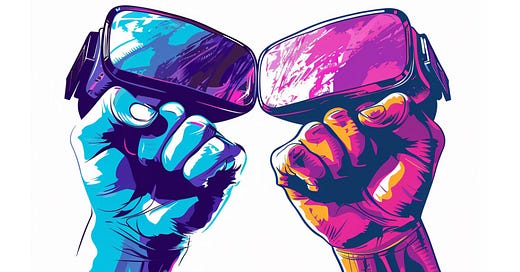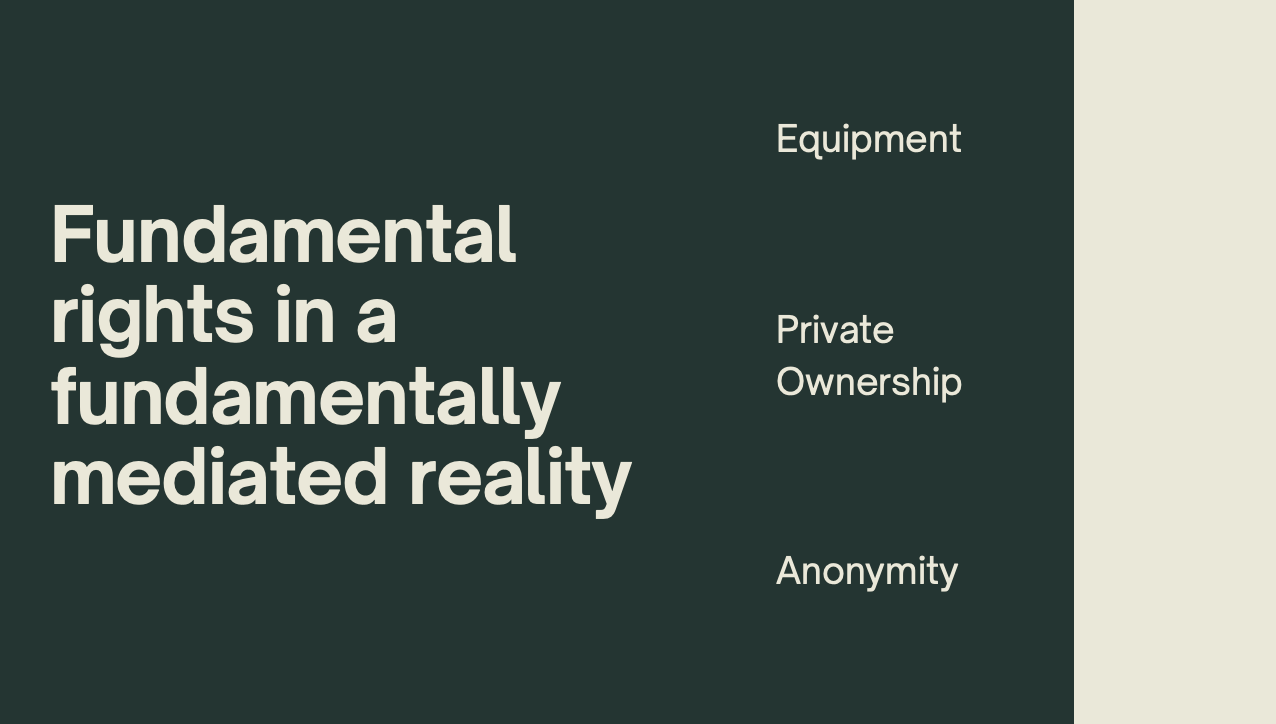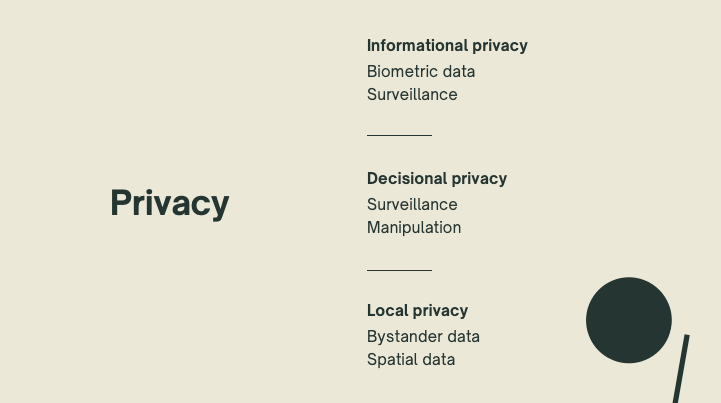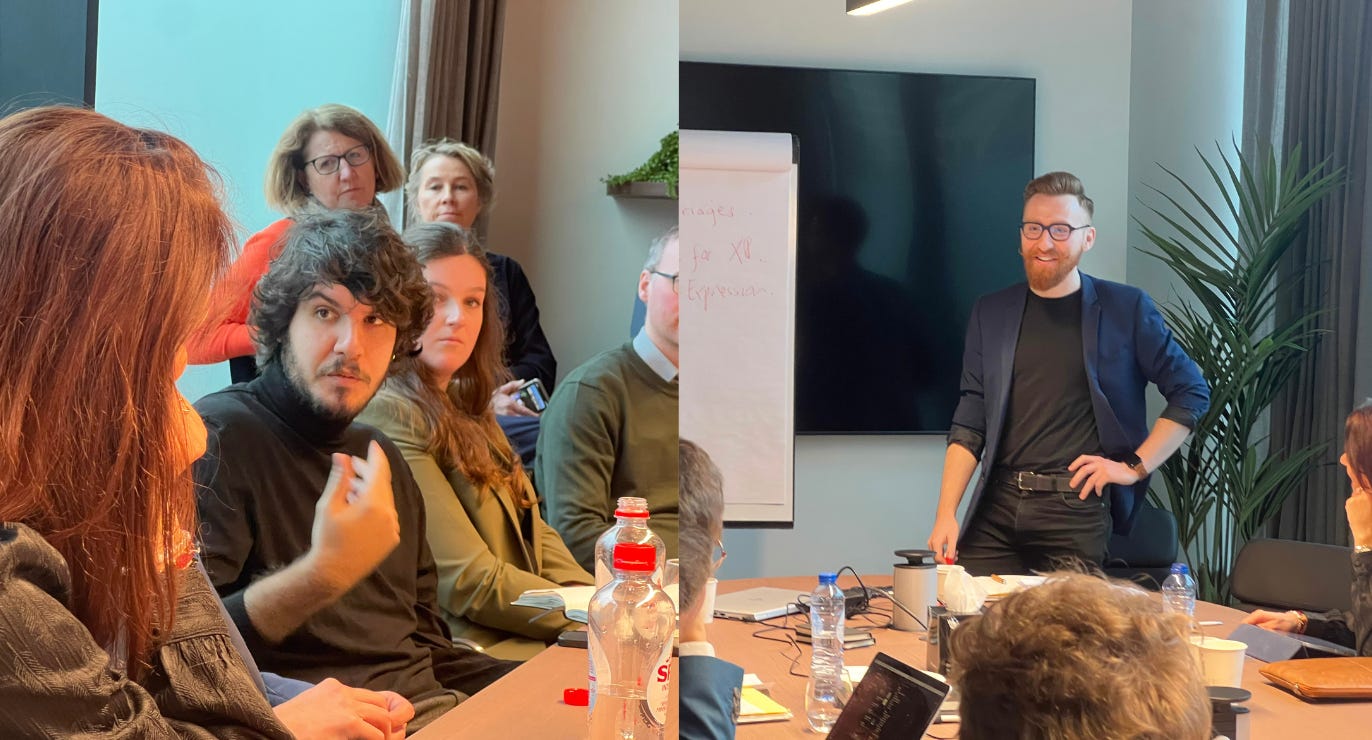Safeguarding Fundamental Rights in XR
This analysis is provided by Emmie Hine, who is pursuing a PhD in Law, Science, and Technology at the Universities of Bologna and KU Leuven, provides this analysis. Her research centres on the ethics and governance of new technologies, with a special emphasis on their use in China. Emmie's doctoral thesis explores how extended reality (XR) technology affects fundamental human rights.
Let’s start with a premise: the virtual is real. Often, we contrast the “virtual” and the “real” when what we really want to be discussing is the “virtual” and the “physical.” Virtual experiences are real in that they impact us like physical experiences do. Who hasn’t been affected by a cute cat photo or a friend’s emotional Instagram post?
In virtual reality—and the wider category of extended reality (XR)—experiences impact us much more because of their embedded sense of realism, which creates similar physiological and psychological impacts as physical experiences. This includes significant potential for harm, with victims of VR sexual abuse reporting genuine trauma. The EU’s approach to tech regulation has historically been grounded in protecting fundamental rights, and XR should be no different.
However, XR presents new challenges because it’s a fundamentally mediated reality, meaning that other things control what you see and how you experience your environment. The most obvious of these is equipment. You don’t need a special device to experience the physical world, but XR depends on headsets, glasses, and other technologies, which decide what and how you sense and experience things.
This also bakes a level of inequality into XR. There’s nothing I can buy to make a physical rose look prettier or smell nicer, but more expensive XR devices make a tangible difference in the quality of one’s XR experience, raising the possibility that a fundamentally mediated reality is also a fundamentally unequal one.
The ones deciding how your devices mediate your reality, though, are hardware manufacturers and platforms. Companies are to the metaverse what governments are to the physical world, but more powerful because they define the fabric of reality itself and thus have tremendous power over our experiences, with corresponding implications for fundamental rights. The decisions made about hardware and platform design, including what data is collected, what accessibility measures are in place, and platform behavioural moderation policies, impact who can access XR and the quality of their experiences when they do.
The final level of mediation is self-presentation. Going beyond “dressing for success” in the physical world, in the metaverse, you can present yourself however you want (within the confines of the mediating platform). This allows you to manipulate your self-presentation for a variety of reasons ranging from empowerment to abuse and includes the possibility of anonymity, which can cause a “disinhibition effect” that sees people behave worse than if they were identifiable.
Thrown into relief by this theoretical backdrop is a variety of real risks. Among these are risks to physical safety, mental health, and social stability. Many of the mental and social risks are because of the effects of harassment, which platforms are struggling to deal with. What’s called “content moderation” on the 2D Internet is really behavioural moderation in the 3D metaverse, and monitoring the behaviour of users in real-time is logistically complicated. And children are especially vulnerable, with cases of grooming and inappropriate content exposure already reported.
The conversation around online privacy often gets reduced to data protection, but legal conceptions of privacy go beyond this informational aspect to include decisional privacy (the idea that personal decisions should be private and freely made) and local privacy (about the sanctity of the home and other physical spaces). Biometric data protection is critical because of the sensitivity of the vast amounts of biometric data that XR devices collect. For instance, motion data can be aggregated into an identifiable “kinematic fingerprint,” and so the GDPR’s notion of biometric data, which centers around identifiability, must be interpreted to include aggregated data.
On the decisional privacy side, biometric data and microreactions could potentially be used to “nudge” people into specific decisions, and the surveillance inherent to XR platforms might chill certain behaviours. And local privacy is threatened by XR devices’ ability to collect data about your surroundings—including bystanders—with the Apple Vision Pro called the “ultimate surveillance device” because of its twelve cameras, six microphones, and plethora of sensors.
Assembly and expression could potentially be supported by XR—people living in authoritarian countries could use the metaverse for protests, for instance—but this will put platforms in the complex position of deciding which assemblies and what expression to permit, with potential geopolitical ramifications. We should consider whether we want to give platforms this amount of political power and corresponding influence on fundamental rights.
A theme throughout all the recent EU policy discussions is the hesitancy to jump into regulating without fully considering the ramifications. While it’s understandable that the EU wants to create an innovation-friendly regulatory environment, given the real and present dangers to individuals, there are certain measures that could be taken immediately to protect people, like criminalising XR assault and explicit deepfakes. The EU is ahead of the global curve on considering policy risks associated with XR but shouldn’t “hurry up and wait.” While we analyse the full legal ramifications of the metaverse, we should act on the harms that are already manifesting.
Ultimately, we must ensure that the private companies that make these new worlds possible create safe, equitable, respectful experiences for all through appropriate oversight, governance, and regulation. Our new extended realities depend on it.
Aside from her academic pursuits, Emmie engages with a wider audience through her weekly newsletter, the Ethical Reckoner, where she discusses issues related to technology ethics and current events. Check it out!
🇪🇺 EU Metaverse policy
European Commission
The Commission proposed updated rules on child sexual abuse material. The revision expands the definition of offences to reflect “the development of augmented, extended and virtual reality settings and the possibility of misusing artificial intelligence to create “deepfakes”, i.e. synthetically created lifelike child sexual abuse material”. The criminalisation of offending material, the proposal says, “should not be limited to voice, text or mail conversations, but also include contacts or exchanges in augmented, extended or virtual reality settings.”
The Commission launched a tender worth €800k for a pilot project—“A Space for the Metaverse”—to inform EU policymakers and stakeholders of challenges and possible governance mechanisms.
Renate Nikolay, deputy head of DG CNECT—the EU’s tech ministry—stated at DIGITALEUROPE's Masters of Digital event: “The next big opportunity is virtual worlds... digital twins, gaming environments... the metaverse is where we can use our industrial base."
Parliament
Axel Voss MEP, whom EU Matrix recently awarded the most influential parliamentarian on digital policy, gave a keynote and participated in a half-day symposium run by Foundation Metaverse Europe. Metaverse EU supported the symposium and led a workshop on identity in the metaverse.
Council of the EU
In a leaked document outlining the Future of Digital Policy, the Council gave a nod to the importance of “virtual worlds” and other innovative digital technologies.
Elsewhere
🇩🇪 Project Immersive Democracy published three studies on hate speech in VR gaming, social VR platform design, and the use of VR in police training.
🇳🇱 The Rathenau Institute’s report on Immersive Technologies, released in November, is now available in English.
🇩🇪 The International Search Partners Association (ISPA) published a paper on “Beauty ideals on the Internet: tips for confidently dealing with beauty Ideals in virtual worlds” (in German).
⚖️ The Centre on Regulation in Europe (CERRE) released a new report, “Emerging Virtual Worlds: Implications for Policy and Regulation”.
🏃♀️ The Federation of the European Sporting Goods Industry (FESI) released its manifesto for the upcoming EU elections—“FESI Playbook – Shaping the Future European Policy Agenda”—which states, “Addressing both the innovative opportunities of the Metaverse and the importance of preserving IP rights will help drive digital transformation of the EU economy and society.”
🚸 As part of Safer Internet Day, Better Internet for Kids published “Keeping children and young people safe in virtual worlds” and an extensive list of resources from across member states.
🎙️ Politico EU interviewed Markus Reinisch, Meta’s vice president for public policy in Europe, to discuss Europe’s potential to be a global leader in metaverse technology.
🌐 Global Corner
This section comes from our anonymous contributor
Policy
🇺🇳 The first 'UN Virtual Worlds Day' will take place on June 14, event. The event will emphasise the transformative power of the metaverse to accelerate progress towards the Sustainable Development Goals. Policymakers will discuss how to regulate and safeguard the metaverse and demonstrate the most recent technology advancements in VR, AR, and spatial computing. Read more.
🇨🇳 China’s Supreme People’s Procuratorate promised punishment for criminals utilising blockchain technology and metaverse projects for nefarious operations. Read more.
🇮🇳 The Maharashtra government has created a virtual site that allows the city's estimated 21 million residents to stay updated on developments via the metaverse. Read more.
🇸🇦 The Saudi Ministry of Culture announced its National Cultural Metaverse Platform, enabling users to enjoy virtual reality history tours and other experiences. Read more.
🇯🇵 The City of Tokyo launched an interactive metaverse tourism platform, inviting creators to send their designs to build it. Read more.
🇬🇧 Researchers at the University of Cambridge conducted a study that used virtual reality to successfully diagnose early Alzheimer’s risk in men. Read more.
🇬🇧 The UK government will fund an Immersive Arts programme to support 200 artists exploring the creative potential of metaverse technology. Read more.
“From the printing press to digital streaming, leaps forward in technology have always led to advances in art and creativity… Blockbuster shows like Abba Voyage demonstrate that extended reality brings about artistic innovation and a list of economic benefits that goes on and on and on.” — Saqib Bhatti, the UK’s Minister for Tech and the Digital Economy.
Business
🎶 The Chief Product Officer of Improbable, which makes metaverse infrastructure and applications, likened the expansive metaverse experience to "a digital Glastonbury or a digital Coachella." Read more.
🌌 Epic and Disney recently announced an “expansive entertainment universe”, providing a tantalising glimpse into the future of entertainment and play with audiences segmented into players, gamers, and fans. It appears that interoperability is on the horizon, with Disney following the LEGO Group into the Fortnite space. As this collaboration progresses, we can expect to see the iconic Disney emblem seamlessly integrated alongside other industry giants like Xbox, PlayStation, Nintendo, Meta, Google, and Apple. Read more.
Events
21 Mar Best of Europe: XR, AI, Immersive Tech (virtual)
21 – 24 Mar Invisible Festival (Brussels 🇧🇪)
3 – 4 Apr XR Expo (Fellbach 🇩🇪)
9 – 10 Apr A Metaverse for the Good (Barcelona 🇪🇸)
10 Apr – 14 Apr Laval Virtual (Laval 🇫🇷)
8 May ARVR Innovate Conference (Dublin 🇮🇪)
13 – 14 Jun Towards a Responsible Development of the Metaverse (Alicante 🇪🇸)
29 – 30 Oct AWE EU 2024 (Vienna 🇦🇹)






